Public Access: More than Just a Beach-Goers Right
February 14, 2019
The concept of public access to water as a common right goes back to the Ancient Romans. Emperor Justinian codified the concept of public access in Roman law as the Public Trust Doctrine around 500 AD. Over centuries, the Public Trust Doctrine’s tenet of public access to tidal waters was carried on through English Common Law and eventually in the laws governing the United States upon its incorporation. The basic principle of the Public Trust Doctrine is that the right to the waters shores is as common to man as the right to breathe the air and warm in the sun.
Through the Public Trust Doctrine, it is the duty of the state to protect the public’s right to access the shoreline. While much of focus tends to fall on New Jersey’s shore towns, the right to public access is equally important to the cities north of the Raritan River. It is no happy coincidence that many shore towns offer parking and restroom facilities along their beach avenues; it is a result of the State’s Public Trust Doctrine. Towns are required to allow shoreline access, provide parking, and install restroom facilities at pre-determined intervals along the shoreline. Additionally, towns with public beaches are not permitted to charge unreasonable beach access fees, or charge exorbitantly higher fees to out-of-town residents. All of this stems from the pursuit of protecting the public’s right to access New Jersey’s tidal waters and shorelines.
In some aspects, the right of public access is at greater risk to North Jersey residents, many of whom do not or cannot make regular trips “down the Shore” and can only access the waters along the rockier and less accessible shores of the Hudson or Passaic Rivers. For those residents, access to the shoreline is often in the form of river walks, fishing piers, or small-craft launch sites. Physical access to shorelines in many urban areas is sometimes restricted by private industrial properties, at ports protected by Homeland Security, and by large condominium complexes. However, even where private property exists, the public’s right to access the shoreline is still protected. The only true restrictions exist where the public right to access conflicts with National Security interests; otherwise, access must be granted to the public up to the mean high water line and generally includes a reasonable portion of dry sand areas as well.
In more densely developed cities and towns, there is a delicate and often imperfect balance between granting public access and protecting private property rights. It takes a strong commitment to protecting the right of public access and a genuine understanding of the value and benefits associated with it to achieve parity. Access to the water can provide a sense of peace, a profession, a sense of community, sources of food or recreation, and even transportation. However, for any of these values and benefits to be realized, the public must first be able to access the water; and that is where the state must be relied upon to protect our interests under the Public Trust Doctrine.
There is currently a bill before the New Jersey State Assembly and Senate Appropriations Committees that will codify the Public Trust Doctrine into law; making the right to public access a NJ law rather than simply a doctrine to follow. Finally achieving official codification is largely the result of a legal battle with the NJDEP and a series of compromises between stakeholders during the drafting process. While the bill is not perfect, it is certainly a serious step in the right direction. Going forward, once this bill is signed into law, it will be easier for the public to exercise the right to public access and for groups like NY/NJ Baykeeper to fight on the publics’ behalf if that right is violated. As always, NY/NJ Baykeeper will keep a close watch on the bills’ progress and pursue amendments in the future to make the bill a better version of itself on behalf of the people of New Jersey.
Click here to read more about the Public Trust Doctrine in New Jersey.
To report public access violations, please contact NJDEP at (609) 777-DEP3.
